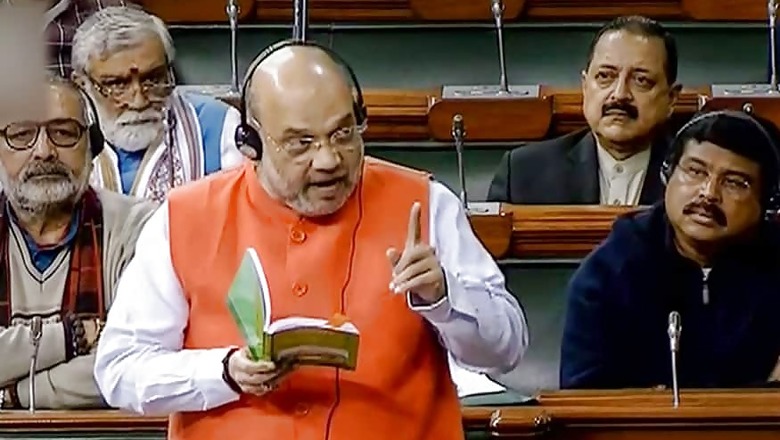
views
New Delhi: While tabling the Citizenship Amendment Bill (CAB) in the Lok Sabha on Monday, Union Home Minister Amit Shah assured that the proposed Bill "intends to provide protection to the persecuted minorities in Pakistan, Afghanistan and Bangladesh."
However, the contents of the Bill, which was passed in the Lok Sabha on Monday night, seem to be incompatible with some arguments put forth by the government at the time of its introduction. Particular the fact that the six clauses the bill seeks to amend do not mention "persecution" as the basis for granting citizenship or "persecuted minorities" as the beneficiaries of the legislation.
Section 57 of the Citizenship Act of 1955 in the Constitution of India, the Bill proposes, be amended by inserting a new clause. It provides that "any person belonging to Hindu, Sikh, Buddhist, Jain, Parsi or Christian community from Afghanistan, Bangladesh or Pakistan" who entered into India on or before December 31, 2014 will not be treated as illegal immigrant.
But the six clauses of the Bill refer to the above sections of society only as 'communities'. as opposed to the BJP-led central government's arguments claiming they are "persecuted communities" as the reason for offering them a chance to return to India.
However the the word "persecution" finds mention is in the Statement of Objects and Reasons delivered by Shah. Justifying the Bill in Clause 2 of the Statement, he said: "The constitutions of Pakistan, Afghanistan and Bangladesh provide for a specific state religion. As a result, many persons belonging to Hindu, Sikh, Buddhist, Jain, Parsi and Christian communities have faced persecution on grounds of religion in those countries."
Senior advocate and founder of the Human Rights Law Network (HRLN) Colin Gonsalves told News18 that the version of the Bill that we are told about and one that the Lok Sabha has passed, have huge differences.
“In Pakistan, there are Ahmadiyyas who are persecuted. In Afghanistan, there are the Hazaras who are persecuted. These two communities are also present in India as refugees. They have come to India and the United Nations Human Rights Commissions (UNHRC) has recognised them as refugees, which means that the UN has recognised that they are persecuted. The BJP started off by telling everyone that they are taking care of persecuted minorities but actually they are excluding persecuted minorities and ordinary minorities,” he added.
According to Gonsalves, the absence of the word “persecution” may legally come down heavy on the BJP. “They will be asked: if you are allowing non-Muslims (who are not persecuted), then why don’t you allow the Muslims.”
However, former Attorney-General of India and constitutional expert Soli Sorabjee, who has voiced his opposition to the Bill, believes otherwise. “It is not unconstitutional as long as in the course of the proceedings they have explained it. The Lok Sabha passed it after the explanation and the same will be up in the Rajya Sabha. Explanation of its need matters,” he told News18.
“The short motive of the absence of the word persecuted in the Bill is to get the BJP out of the political conundrum that it finds itself,” Harsh Mander, noted human rights activist and director at Centre for Equity Studies, explained News18.
According to him, the conundrum lay in the fact that much larger figure of Hindus has been left out of the National Register of Citizens (NRC) in Assam than Muslims, and that under the 2004 amendment to the Citizenship Act of 1995 their progeny will not be given citizenship.
“To get out of the conundrum, which is also a political suicide, the BJP imagined this Bill. If they had used the word persecuted, persons would have had to present evidence of persecution. In effect, what the Bill is saying is that if you are a Hindu, Sikh, Parsi, Jain, Christian or Buddhist minority in another country, it will be assumed that you are persecuted, while Muslims will be assumed to be illegal immigrants until proven,” he said.
“In the post-NRC situation, everybody not in the list will have to claim that they are Bangladeshis in order to become Indian. Even if a person is not persecuted, they will have to claim they are a foreigner. This is a deliberate action because the legal requirements of proving persecution will be impossible as most of these people are not illegal immigrants.”
Under the ambit of the Bill, Hindu, Christian, Buddhist, Jain or Parsi communities from India's three border sharing Islamic neighbours are eligible to apply for Indian citizenship (via certificate of registration of certificate of naturalisation) under the Third Schedule of the principal Act by residing in the country for "not less than five years."
Journalist and activist Saket Gokhale, who is in the process of filling a writ petition against the Bill in the Supreme Court, told News18 that the Bill “does not intend to protect refugees but rather exclude one community.”
“The government could have worded the Bill as ‘persecuted minorities from countries….’ or ‘persecuted minorities belonging to the religion…’ and so and so. But, the Home Minister constantly makes references to the NRC instead. This Bill only lays the groundwork for a nationwide NRC,” Gokhale added.
In his speech in the Parliament and on numerous occasions elsewhere, Shah and other BJP leaders have maintained that the Bill is only for Hindu, Sikh, Buddhist, Jain, Parsi and Christian communities as Muslims themselves cannot be a minority community being persecuted in Muslim majority Islamic countries of Bangladesh, Paksitan and Afghanistan.

















Comments
0 comment